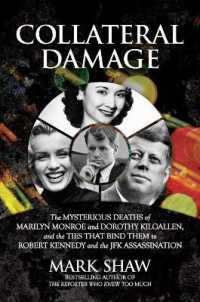- ホーム
- > 洋書
- > 英文書
- > Literary Criticism
Full Description
Socially, politically, and artistically, the 1950s make up an odd interlude between the first half of the twentieth century-still tied to the problems and orders of the Victorian era and Gilded Age-and the pervasive transformations of the later sixties. In Revolution, Matthew Wilkens argues that postwar fiction functions as a fascinating model of revolutionary change. Uniting literary criticism, cultural analysis, political theory, and science studies, Revolution reimagines the years after World War II as at once distinct from the decades surrounding them and part of a larger-scale series of rare, revolutionary moments stretching across centuries. Focusing on the odd mix of allegory, encyclopedism, and failure that characterizes fifties fiction, Wilkens examines a range of literature written during similar times of crisis, in the process engaging theoretical perspectives from Walter Benjamin and Fredric Jameson to Bruno Latour and Alain Badiou alongside readings of major novels by Ralph Ellison, William Gaddis, Doris Lessing, Jack Kerouac, Thomas Pynchon, and others.
Revolution links the forces that shaped postwar fiction to the dynamics of revolutionary events in other eras and social domains. Like physicists at the turn of the twentieth century or the French peasantry of 1789, midcentury writers confronted a world that did not fit their existing models. Pressed to adapt but lacking any obvious alternative, their work became sprawling and figurative, accumulating unrelated details and reusing older forms to ambiguous new ends. While the imperatives of the postmodern eventually gave order to this chaos, Wilkens explains that the same forces are again at work in today's fracturing literary market.
Contents
Acknowledgments 1. Introduction Part 1: The Structure of Literary Revolutions2. Allegory3. Event4. The Encyclopedia as Object and Metaphor Part 2: Failure and Novelty in Postwar Fiction5. Allegory, Encyclopedism, and Postwar America6. Ellison's Impure Manifesto7. Integration and Disorder in The Golden Notebook NotesBibliographyIndex








